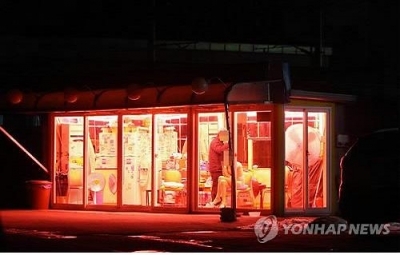This year marks the 10th anniversary of South Korea’s establishment of its antiprostitution law, which criminalizes the buying and selling of sex.
In spite of the special law, however, the number of female sex workers in South Korea increased 3.8 percent from 2010 to 2013, according to the latest report released by the Ministry of Gender Equality and Family.
The number of women working in the sex trade stood at 5,103 in 2013, up from 4,917 in 2010. Almost 80 percent of these women were in their 20s and 30s, according to the report.
For the report, researchers interviewed a total of 15 female sex workers about their experiences.
In spite of the special law, however, the number of female sex workers in South Korea increased 3.8 percent from 2010 to 2013, according to the latest report released by the Ministry of Gender Equality and Family.
The number of women working in the sex trade stood at 5,103 in 2013, up from 4,917 in 2010. Almost 80 percent of these women were in their 20s and 30s, according to the report.
For the report, researchers interviewed a total of 15 female sex workers about their experiences.

Among them, 86.6 percent said their parents had gotten divorced and they had grown up in broken homes, while 13.4 percent said they had suffered from poverty and domestic abuse before working in the sex industry.
Meanwhile, 60 percent of the women said they became involved in prostitution as teenagers after running away from home.
Twelve of the 15 interviewed women either did not attend or did not finish high school. Three of them enrolled in postsecondary education but never graduated.
The study also found that among 2,180 men who illegally bought sex, the largest number ― 26.3 percent ― visited massage parlors. The second and third most-visited places of prostitution were red-light districts with more than 10 brothels in operation, and bars that offer illegal sexual services.
Among 1,200 Korean men surveyed for the study, 56.7 percent said they had bought sex at least once in their lives, while 27.2 percent said they had done so in the past year. More than 70 percent of men who paid for sex last year were in their 30s and 40s.
“We also discovered that those who committed the crime more than 10 times consisted of both married men and singles,” said the Gender Equality Ministry in a statement.
“Based on these findings, we have concluded that the argument that prostitution is necessary for men who are single, as they have no outlet for their sexual desire, is not valid.”
Only 57.7 percent of those who paid for sex were aware of the antiprostitution law, while 93.1 percent of those who did not commit the crime understood that the act of buying and selling sex was illegal.
Upon learning about the law, 78.3 percent of those who had bought sex said they had decided not to repeat their crimes, while only 70.3 percent of them said the same back in 2010.
In general, more Koreans have become aware of the law, at 93.1 percent last year versus 69.8 percent in 2009, according to the report.
“We will continue to offer education programs (about the illegality of the sex trade) and continue with our campaign against the sex trade,” said Gender Equality Minister Kim Hee-jung. “The sex trade involves the denial of human dignity and therefore it must stop. We will try our best to enforce the ethical principle that humans cannot be bought and sold.”
By Claire Lee (dyc@heraldcorp.com)


















